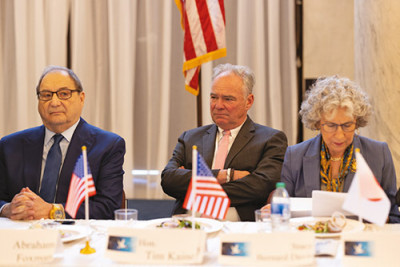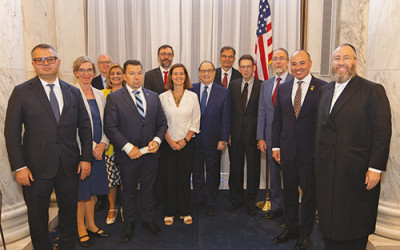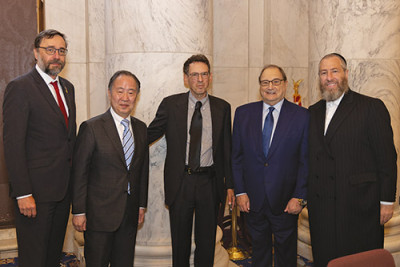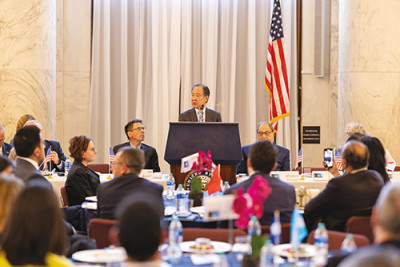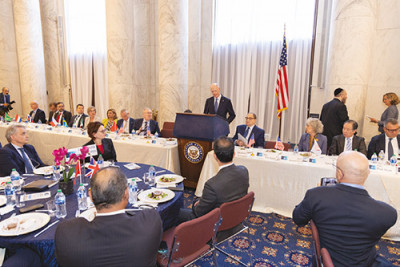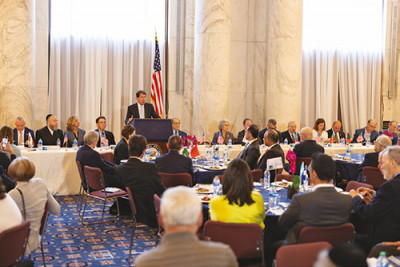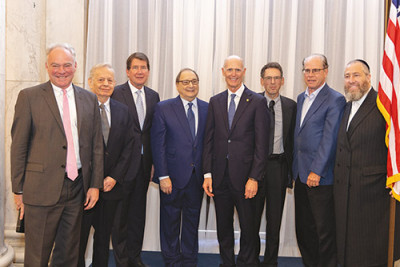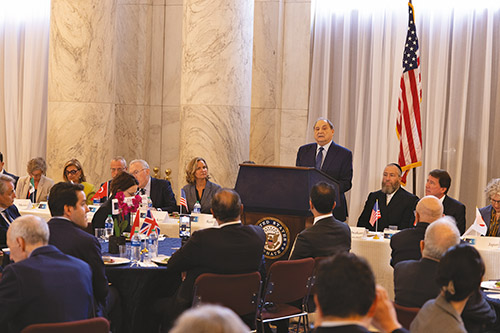
The ornate Kennedy Caucus Room of the Russell Senate Office Building featured a historic event heralding the introduction of bipartisan legislation S.91-Forgotten Heroes of the Holocaust Congressional Gold Medal Act (https://www.congress.gov/bill/118th-congress/senate-bill/91), awarding a Congressional Gold Medal to 60 diplomats in recognition of their heroism and bravery during the Holocaust.
These diplomats used every means at their disposal to help Jews fleeing persecution. One of the most powerful tools the diplomats had was the issuing of passports and travel visas contrary to the instruction of the governments of the diplomats. This process alone was responsible for saving hundreds of thousands of Jewish families in Europe. This was not the only tool used, as many of the diplomats were connected with the local populations and were great communicators for Jews trying to travel underground. They were able to set up safe houses and getaways to hide Jews and especially Jewish children from Nazi authorities. In the most dangerous of times, several of these diplomats confronted the Nazis directly on behalf of the Jews and personally put themselves in grave danger.
Spearheaded by Project Legacy, this Congressional effort is chaired by Abraham Foxman, the national director emeritus of the Anti-Defamation League (ADL) and entrepreneur Art Reidel.
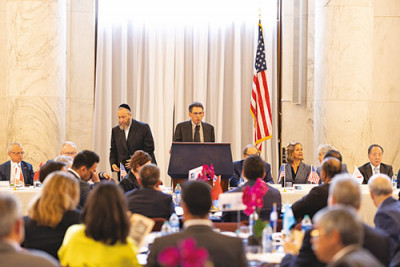
Laura Curran, a former Nassau County executive, who served as the emcee for the event, praised U.S. Representatives Maria Salazar and Ritchie Torres for introducing a companion bill in the U.S. House of Representatives, H.R. 537.
Stacy Bernard Davis, the deputy special envoy for Holocaust issues represented the U.S. Department of State.
Chair of the Forgotten Heroes of the Holocaust Congressional Gold Medal Committee (https://forgottenheroesoftheholocaust.org), Abraham Foxman encapsulated the significance of the legislative effort with a moving statement: “I decided a long time ago not to be a witness to the evil, to the brutality that men are capable of. I decided to bear witness to goodness, to decency, to compassion, to humanity, to my nanny Bronislawa Kurpi, and to all others who have made a colossal difference in that they saved lives—Jewish lives. And that’s why I am here today and that’s what hopefully you’re here to celebrate, to honor, to embrace, to thank those diplomats who risked their careers, their reputations, their pensions and maybe their freedoms to save Jews, thousands of Jews. I am humbled by this privilege, and as a child survivor who never had the chance to say thank you to my Polish Catholic nanny. I’m standing in our nation’s Capitol chairing an effort to say thank you. Thank you to diplomats who saved humanity’s reputation, for saving human beings, for saving the Jews.”
Art Reidel, co-chair of the Forgotten Heroes of the Holocaust Congressional Gold Medal Committee, expressed his strong support for the Forgotten Heroes of the Holocaust Congressional Gold Medal Act, stating, “I feel strongly that our taking this action and supporting this bill is especially important at this time in this place. I do not need to explain to anyone here the moral challenges that we face today but I will respectfully remind
everyone that at the time of the Holocaust in this city, many in positions of power failed to stand up and allowed innocent deaths that they could have prevented. Hopefully, with the example of the heroes in mind, we will all be strengthened in our resolve to never repeat that tragic history … the silence and the failure to act of so many powerful people who knew exactly what was happening in Europe, but failed to do what they could, what was within their power to save lives.” This is why he believes it’s so important to honor the sacrifice and bravery of the heroic diplomats at the center of this legislation as they “did do everything in their power to save innocent lives” and that we need to “spread the message of their example and good people can and do need to stand up, accept risk, and use their full powers to save lives in the face of evil.”
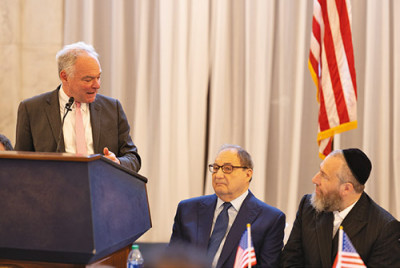
Dr. Mordecai Paldiel, academic adviser for the bill, has conducted extensive research on the theme of Righteous Among the Nations, expressed his belief that the heroic acts of the these 60 diplomats must be etched into history, asserting, “The 60 people on our list, they didn’t know each other, they didn’t consult with each other, they did not belong to a rescuers club, but they all decided that the values of humanity, of civilized life, of moral life are at stake and they had to make a decision. They were there on the spot, they saw it. They were not Mother Teresas, they were not cut out to be saints, but they did saintly things, saintly acts.”
The program featured remarks by U.S. Senator Bill Hagerty, who explained his motivation for sponsoring the bill and the deep significance this legislation holds. Previously serving as the United States ambassador to Japan, he said this bill has a special meaning to him. In his role he understood that “his first and foremost duty was to take care of the safety and security of the 250,000 Americans that resided in Japan on any given day. That’s a responsibility that every Ambassador and every diplomat takes very seriously.” As he mentioned in his speech, the story of Chiune Sugihara, the first Japanese diplomat posted in Lithuania during World War II, really resonated with him. He facilitated the escape of thousands of Jewish refugees, issuing 1,800 transit visas to help these Jewish refugees escape Nazi-occupied Europe. Senator Haggerty is immensely proud of the brave actions these diplomats undertook, calling them “beacons of light in a time of unimaginable darkness” and believes that “the diplomats of today and future generations—and everyone else who hears their stories—can be inspired by their heroism, their sacrifice, and their staunch resolve in the face of nefarious acts of sacrifice.”
The Democratic lead of the bill, U.S. Senator Tim Kaine, discussed the importance of S.91 and his motivations for sponsoring the bill. The issues of fairness and inequality and the battle against antisemitism that frame this legislation are ones this former civil rights lawyer encountered every day in his work when he chose to stand up for what’s right. He believes the great meaning behind this bill is that the “history of these forgotten heroes, if it’s remembered, if it’s reclaimed, if their stories are told, can make our current, present reality and our future brighter.” Senator Kaine maintains that “we have to tell the story of the unspeakable evil of the Holocaust” but at the same time we must “uphold the people who stood up for others and that’s what this is about.”
Participants also heard from Senators Mike Braun and Rick Scott.

Thirteen ambassadors, representing individual diplomats from countries that are listed in the Congressional Gold Medal legislation, shared remarkable stories of these heroes and spoke on how each of these stories inspired them to act bravely and honorably in their own work. The roster of ambassadors included H.E. Tomita Koji of Japan, H.E. Murat Mercan of Turkey, H.E. Ingrid Ask of Sweden, H.E. Marek Magierowski of Poland, H.E. Miloslav Stašek of the Czech Republic, H.E. Bernardo Velloso of Brazil, H.E. André Haspels of the Netherlands, H.E. Radovan Javorčik of the Slovak Republic, H.E. Ana Louisa Fajer Flores of Mexico, H.E. Alexandra Bilreiro of Portugal, H.E. Alessando Gonzales of Italy and H.E. Andrei Muraru of Romania.
